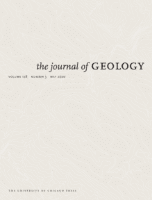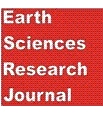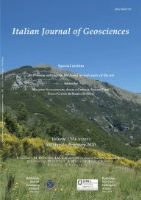
GEUS Bulletin
Scope & Guideline
Unlocking the Mysteries of Our Planet's Systems.
Introduction
Aims and Scopes
- Geological Research:
The journal emphasizes studies related to the geological formations, stratigraphy, and sedimentology of the Greenland and Danish regions, often highlighting novel findings in the context of historical geological developments. - Hydrological Studies:
Research on water resources, groundwater quality, and hydrological modeling is a significant focus, reflecting the journal's commitment to addressing water supply issues and environmental impacts. - Paleoenvironmental Reconstructions:
The journal publishes articles that reconstruct past environments using geological and geochemical data, providing insights into climate change and sea-level rise impacts. - Technological Innovations:
There is a strong focus on innovative methodologies, such as machine learning applications in geology and hydrology, which reflect the journal's commitment to advancing research techniques. - Open Access Data Initiatives:
The GEUS Bulletin supports open access to geological and hydrological datasets, promoting transparency and collaboration in research within the scientific community.
Trending and Emerging
- Machine Learning Applications:
Recent publications showcase an increasing application of machine learning techniques in geological modeling and data analysis, indicating a trend towards utilizing artificial intelligence to enhance research efficiency and accuracy. - Environmental Impact Studies:
There is a growing focus on the environmental implications of geological processes, including studies on groundwater contamination and the effects of climate change on water resources, reflecting heightened awareness of sustainability issues. - Interdisciplinary Research:
Collaborative studies integrating geology, hydrology, and environmental sciences are on the rise, demonstrating a trend towards holistic approaches to understanding complex geological and hydrological systems. - Open-access Data Sharing:
The journal has increasingly highlighted the importance of open-access datasets, encouraging the sharing of geological and hydrological information to foster collaboration and transparency in research. - Paleoenvironmental and Climate Change Research:
There is a notable increase in studies focusing on paleoenvironmental indicators and their implications for understanding past climate changes, which are critical for predicting future environmental shifts.
Declining or Waning
- Paleozoic Studies:
Research focused on Paleozoic geological formations appears to be less frequent, possibly indicating a shift towards more recent geological periods and their implications for current environmental conditions. - In-depth Case Studies of Specific Localities:
While localized studies were previously a staple, there seems to be a waning interest in detailed case studies of specific geological sites, with a broader regional focus becoming more prevalent. - Traditional Geochemical Analysis:
There is a noticeable decline in publications centered around conventional geochemical analysis methods, as newer technologies and analytical techniques gain traction. - Geological Mapping Projects:
Although geological mapping remains relevant, the frequency of publications related to traditional mapping efforts has decreased, indicating a potential shift towards digital and GIS-based approaches.
Similar Journals

Moscow University Geology Bulletin
Connecting Scholars in the Quest for Geological TruthsMoscow University Geology Bulletin, published by SPRINGER INT PUBL AG, is a prominent platform for disseminating critical research in the field of Earth and Planetary Sciences. With an ISSN of 0145-8752 and an E-ISSN of 1934-8436, this journal is well-regarded for its contributions to diverse geological studies and interdisciplinary advancements that shape our understanding of the planet. The journal has established itself in the academic community, particularly noted for its ranking in the Q3 category within Earth and Planetary Sciences as of 2023. Despite its limited open-access options, the Moscow University Geology Bulletin remains an essential resource for researchers, professionals, and students through its well-curated articles and synthesis of geoscientific knowledge. With annual volumes converging from various years, including significant years like 2012 to 2024, it aims to uphold its mission of fostering scholarly dialogue and innovation in the geosciences.

Geosfernye Issledovaniya-Geosphere Research
Advancing Knowledge in Earth SciencesGeosfernye Issledovaniya-Geosphere Research, published by TOMSK STATE UNIVERSITY, is a significant addition to the scholarly discourse within the fields of Earth and Planetary Sciences, Ecology, and Geography. With a focus on innovative research and insights that span a broad spectrum of environmental and geographical studies, this journal aims to provide a platform for researchers and students alike to disseminate their findings and discuss pressing issues facing our planet. Though classified in the Q4 quartile for its 2023 metrics, it serves as an important venue for early-career scientists and scholars from the Russian Federation and beyond to contribute to the global dialogue surrounding geosciences. The journal operates with various access options, making it accessible to a diverse audience. It encourages submissions that inspire robust discussion and exploration of topics vital to our understanding of the geosphere and its intricate dynamics. Covering the pivotal years from 2019 to 2024, Geosfernye Issledovaniya-Geosphere Research is poised to enhance its relevancy and impact within the academic community.

Frontiers of Earth Science
Exploring the Depths of Earth and BeyondFrontiers of Earth Science is a prominent academic journal in the field of Earth and Planetary Sciences, published by Springer. With an ISSN of 2095-0195 and an E-ISSN of 2095-0209, this journal serves as a significant platform for researchers and professionals to disseminate their findings from 2007 to 2024. It is recognized for its impactful contributions within the category of Earth and Planetary Sciences, boasting a respected Q2 ranking in 2023. With a Scopus ranking of 64 out of 195, placing it in the 67th percentile, Frontiers of Earth Science continues to drive academic dialogue and innovation. The journal is dedicated to exploring a diverse range of topics, including geology, meteorology, and environmental science, and amplifying the understanding of Earth systems through rigorous research. Located in New York, USA, this journal embraces an Open Access model, ensuring that groundbreaking research is readily available to the global scientific community, thereby enhancing its accessibility and impact.

JOURNAL OF GEOLOGY
Innovative Research Shaping Our Understanding of Geology.The JOURNAL OF GEOLOGY, published by University of Chicago Press, serves as a premier platform for disseminating groundbreaking research in the field of geology. Established in 1973, this esteemed journal has consistently ranked in the Q2 category in geology, further solidified by its Scopus ranking, where it is positioned at 99 out of 321 in Earth and Planetary Sciences, marking it in the 69th percentile of its category. With an emphasis on innovative and interdisciplinary studies, the journal features peer-reviewed articles that contribute to the understanding of geological processes, earth materials, and environmental interactions. Although it does not currently offer open access, it facilitates broad access through academic institutions to reach a global audience of researchers, professionals, and students striving to advance the knowledge of Earth's history and dynamics. As a vital resource for the geology community, the JOURNAL OF GEOLOGY plays an essential role in fostering scholarly dialogue and advancing both academic inquiry and practical applications in geology.

Earth and Space Science
Championing Open Access for Earth and Space Innovations.Earth and Space Science, published by the American Geophysical Union, is a distinguished open-access journal that has profoundly impacted the realms of earth and planetary sciences as well as environmental science since its inception in 2014. With impressive rankings, including Q1 in both Earth and Planetary Sciences and Environmental Science for 2023, this journal ranks 38th out of 195 in the general Earth and planetary sciences category and 51st out of 219 in environmental science, showcasing its commitment to high-quality research dissemination. The journal serves as a vital platform for researchers, professionals, and students, fostering the exploration of critical topics and advancements within these pivotal fields. With an accessible format, researchers can benefit from the rich content available, furthering their knowledge and ensuring that groundbreaking discoveries reach a broader audience. The journal's ongoing commitment to open access aligns with contemporary trends in scholarly communication, emphasizing inclusion and collaboration in tackling pressing global challenges.

Frontiers in Earth Science
Pioneering Research in Earth and Planetary SciencesFrontiers in Earth Science is a leading open-access journal published by FRONTIERS MEDIA SA, based in Switzerland. With its ISSN N/A and E-ISSN 2296-6463, this journal has firmly established itself in the realm of Earth and Planetary Sciences, evidenced by its exceptional Q1 ranking in the 2023 category of Earth and Planetary Sciences (miscellaneous) and a solid position of Rank #66/195 in Scopus, placing it in the 66th percentile among its peers. Since its inception in 2013, Frontiers in Earth Science has embraced the open access model, promoting widespread dissemination and accessibility of research findings. The journal covers a broad scope, including areas such as geology, meteorology, oceanography, and environmental science, fostering interdisciplinary communication and advancement. Researchers, professionals, and students looking to stay at the forefront of Earth science research will find an invaluable resource in this journal, which not only curates high-quality research but also supports innovative and impactful studies that address the pressing challenges facing our planet today.

Carpathian Journal of Earth and Environmental Sciences
Innovating Insights into Earth’s Dynamic ChangesCarpathian Journal of Earth and Environmental Sciences is a distinguished academic journal dedicated to advancing the interdisciplinary field of Earth and environmental sciences. Published by the Carpathian Association for Environment and Earth Sciences, this journal plays a pivotal role in disseminating high-quality research focused on the dynamic interactions between geological processes and environmental changes. With an ISSN of 1842-4090 and an E-ISSN of 1844-489X, the journal is indexed in Scopus and holds an esteemed Q3 quartile ranking in both Earth and Planetary Sciences and Environmental Science categories as of 2023. Since its inception in 2008, the Carpathian Journal has provided an open access platform for researchers, professionals, and students to share insights, foster collaboration, and engage in critical discussions on pressing environmental issues. By continuously contributing to the body of knowledge in this field, the journal not only enhances academic discourse but also promotes sustainable environmental practices across Romania and beyond.

Earth Sciences Research Journal
Unveiling Insights into Earth’s MysteriesThe Earth Sciences Research Journal, published by the UNIV NACIONAL DE COLOMBIA, serves as a pivotal platform for the dissemination of knowledge in the diverse field of Earth and Planetary Sciences since its inception. With an ISSN of 1794-6190 and an E-ISSN of 2339-3459, this Open Access journal has been committed to providing unrestricted access to high-quality research since 2004. Located in Bogotá, Colombia, it has gained recognition within the academic community, achieving a Q3 quartile ranking in Earth and Planetary Sciences and notable Scopus rankings, which further underscores its relevance and reach. Its scope encompasses varied research topics, making it an essential resource for researchers, professionals, and students alike, seeking to contribute to or stay informed on the latest developments in the Earth sciences up to the year 2024. The journal not only anticipates cutting-edge research but also emphasizes collaborative dialogues among global experts, driving forward the conversation on critical issues facing our planet.

Earth Interactions
Bridging Disciplines to Decode Earth’s ComplexitiesEarth Interactions is a prominent journal that serves as a critical platform for interdisciplinary research in the field of Earth and Planetary Sciences. Published by the American Meteorological Society, this journal has established itself as a key resource for scholars, researchers, and professionals dedicated to understanding Earth's complex systems and their interactions. With an impressive Q1 ranking in the category of Earth and Planetary Sciences for 2023, it reflects a commitment to high-quality scholarship and impactful contributions to the field. The journal, with its dedicated coverage from 2004 to 2024, encompasses a wide array of topics, providing comprehensive insights into geological, atmospheric, and environmental phenomena. Although it operates under a non-open access model, its significance is underscored by its placement in the top percentile of Scopus rankings (Rank #89/195), making it an exciting resource for those pursuing advanced studies and applications related to Earth's systems.

Italian Journal of Geosciences
Pioneering Discoveries: Shaping the Future of GeosciencesItalian Journal of Geosciences, published by the Società Geologica Italiana, is a distinguished platform for the dissemination of research in the fields of Earth and Planetary Sciences and Geology. With an impressive impact factor reflected in its 2023 rankings, where it placed in the Q3 category across its related fields, this journal serves as a vital resource for academics, practitioners, and students. Established in 2010 and poised to continue until 2024, the journal showcases critical advancements and interdisciplinary studies that deepen our understanding of geological processes and Earth systems. Operating under open access options, it offers robust accessibility to a broad audience, facilitating wider dissemination of knowledge. The journal's affiliation with Università degli Studi La Sapienza in Rome, Italy, further underscores its commitment to academic excellence and innovation in geosciences.